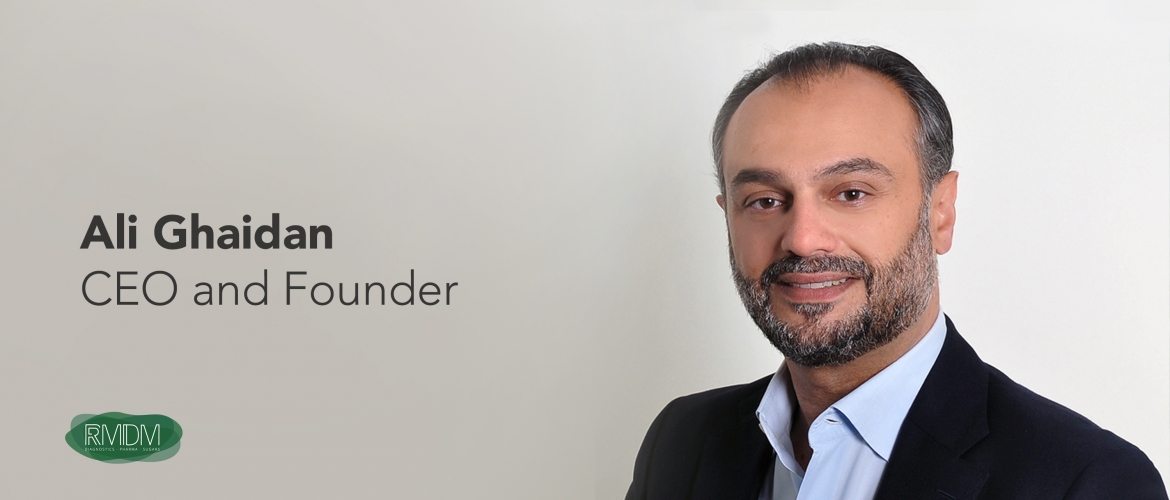Jul 12, 2021 | News
MEET: Ali Ghaidan, CEO and Founder of RMDM

This week healthcare copywriter, Dee Primett, interviews RMDM’s CEO and Founder, Ali Ghaidan.
In this interview, Ali shares more about his background, the story behind RMDM, PanTum Detect and his visions for the future of the company.
RMDM is a one-stop shop for diagnostics, pharma, and nutrition. In collaboration with cancer research scientist Dr Johannes Coy, RMDM has helped develop the first universal cancer detection blood test.
Hi Ali, can we hear more about your background and how you came to found RMDM?
I’ve always wanted to be an entrepreneur, even from an early age I was interested in business and marketing. After completing my degree in marketing management and media communications, I became involved in a variety of businesses, always with a role in business strategy and marketing. I’ve always been passionate about discovering opportunities to develop a unique product or service. When I met Dr Johannes Coy, I knew I’d found something special.
How did you meet Dr Coy and begin your partnership?
I was facing health challenges and started seeing a nutritionist because it was time to transform my diet and improve my lifestyle. I learned more about eating habits and how our diet really affects our health. One of the areas we talked about a lot was sugar consumption, and she recommend I speak to Dr Coy as he had spent time researching the effects of bad sugars and was developing healthier alternatives.
I was very excited to hear about the work that Dr Coy had been doing. He hadn’t only been researching a range of healthy sugars, but he had also created a blood test that was capable of successfully detecting cancer at the earliest stage – PanTum Detect. We discussed the link between nutrition and cancer, and how sugar plays a vital role. And I started thinking, what if we had a one-stop shop which provided both diagnostic testing and nutritional advice.
I reached out to the dear friend of mine, Dr Ahmed Bourghida, and proposed the idea — which is now RMDM.
Where does your passion for health, and specifically for fighting cancer, stem from?
We all know someone who has been affected by cancer in some way. It is the second leading cause of death globally, and when you see the statistics, it’s frightening. When the opportunity presented itself to help save people’s lives, it was a no-brainer.
I think most of us want to be a part of something that enables us to make a difference. I’m motivated by the challenge to raise awareness about the importance of early detection and how PanTum Detect can truly save lives.
How confident are you that PanTum Detect can make a real difference to early cancer diagnosis?
I’m very confident. I feel the industry needs to be shaken up in a positive way. There is so much focus on late-stage treatment and aftercare for cancer, but what if we could detect it at a treatable stage in the first place? The current screening methods are limited to certain types of cancer, they can be time-consuming, expensive and don’t always detect cancer early enough and some, like cervical screening, are very invasive. The research we’ve conducted shows that many patients feel early diagnosis should be a bigger priority for the NHS and would prefer to attend screening appointments that are quicker and less invasive. We believe that PanTum Detect, which is a simple blood draw, is a viable alternative. And as we know, the earlier cancer is detected, the better the outcome is likely to be for the patient. We want to showcase what PanTum Detect can do for the NHS and private healthcare.
With even more stories in the news this month about delayed cancer diagnosis and treatment due to the Covid-19 pandemic, how important do you think it is for the NHS and other healthcare providers to look at new technologies and techniques for tackling the cancer backlog?
The cancer backlog is extremely worrying, and I don’t think we’ve seen the true cost of the pandemic to cancer care yet. Currently, the challenge is that the NHS has limited technologies for early cancer detection, which can be costly and time-consuming. Instead of sending everyone for expensive, invasive screening we could filter out and prioritize people who test positive for cancer with a simple blood test.
This would reduce the amount of people who need further testing, relieve pressure on the NHS, and conserve resources.
For example, our PanTum Detect blood test could be used in primary care settings to identify cancer patients and promptly send them to receive further testing, drastically improving their quality of life.
What’s next for RMDM and PanTum Detect?
Alongside PanTum Detect, we’ve also been working on nutraceutical solutions to help fight things such as cancer, diabetes, Alzheimer’s, obesity and ultimately help people lead healthier lives. We will soon be launching Intelligent Sugar, a website to help inform people on the benefits of healthy sugars, and how the right ‘intelligent’ sugar can help prevent diseases and improve overall health. This is an integral part of our one-stop shop philosophy, combining all facets of diagnostics and nutrition.
We want to make PanTum Detect accessible for everyone, and so far, it is commercially available in the UK, Germany, Holland, Czech Republic, Belarus, Moldova, Lebanon, and Hong Kong. Commercial licenses are also pending in India and Mainland China.
We see PanTum Detect as something that can and should be included in your annual wellness checks with your doctor. Every GP should have access to the test from their own surgery. You may not even have the symptoms of cancer yet, but by detecting it early you’ll increase your chances of survival. It’s a real gamechanger.
You can find out more about RMDM, PanTum Detect and Intelligent Sugars on their website. You can also download the PanTum Detect whitepaper.
Resources:
https://www.cancerresearchuk.org/about-cancer/cancer-symptoms/why-is-early-diagnosis-important